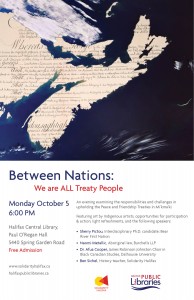Suzanne MacNeil, Executive Vice-President of the Halifax-Dartmouth & District Labour Council and member of Solidarity Halifax, shares her thoughts on the work to be done now that the election is done. Suzanne has just finished working as campaign manager for Sydney-Victoria NDP candidate Monika Dutt.
Originally published in Our Times Magazine.

Suzanne MacNeil. Photo: Our Times Magazine.
Congratulations to all the people who worked, voted, and campaigned hard to get Harper out.
I’m disappointed that we lost so many good, progressive MPs, and that an NDP campaign that proposed substantial reforms like national child care couldn’t succeed the way we needed it to.
I am, however, feeling no small amount of relief that we got rid of a government that was particularly nasty and determined to attack: union workers, the working class in general, women, Indigenous people, immigrants, folks who live in poverty, all manner of public institutions, our environment.
Bear in mind, this is just a moment of relief. The work ahead of us changes, but still needs to go on.
Contrary to the mainstream framing of this, governments are not neutral vessels that can be steered in just any direction by electing the right people and the right ideas.
Government operates under a structural dependence on capital and so, right away, any government that is elected, “progressive” or not, is dealing with a structural bias against social spending.
Governments deal with enormous pressure from large corporations, wealthy elites, and key industrial heavyweights to keep taxes for top income brackets and corporations low, and to keep regulations “business friendly.”
I often refer to this group of interests as “capital” — perhaps an old fashioned word, but the most accurate way to refer to this grouping.
These structural realities directly work against any role government wants to play in setting up new social spending programs, maintaining or improving current ones like universal medicare, and cracking down on environmentally destructive activity.
If government goes “too far” in acting in the interests of the environment and the 99%, the interests of capital go into major pushback mode. The usually idle threat of “taking business elsewhere” takes on a new and sinister manifestation.
We’re familiar with the labour term “strike,” when workers withhold their labour.
The flip side of that is that capital strikes become reality when big business faces the threat of a determined, socially minded government. There are endless examples of this globally, and this is why it will never ever, ever, ever be enough to elect the right people. And never enough to just hope they’ll keep their promises.
Without strong, disciplined organization from supporters of a more just society, governments are forced to choose between the public coffers drying up completely or making major concessions to capital in the interests of keeping basic programs running.
We are still dealing with an historic low-point in the kind of strong organizing we need, and although we have seen a resurgence of social movements in the last five years, the independent building of social movements in our era is still in its infancy. Unions have a long way to go to be strong enough again to make significant gains for the working class.
Our failure to make anti-racist work a priority means that not only do racialized people in Canada face violence and oppression on a daily, ongoing basis but they are also actively targeted by cynical politicians.
We saw what happened with the niqab debacle. The interests of capital have long exploited racism as a dividing tactic.
By failing to deal with this head-on, we not only see progressive policy victories forestalled, but even more crucially, the people who suffer the most real and violent consequences in this scenario are people of colour in our communities. This will keep happening until we can smarten up and do better.
For non-Indigenous Canadians, we also need to be more cognizant of our responsibilities as treaty partners with First Nations people. There is a lot of work to be done in untangling the toxic legacies of colonialism, and doing our part for truth and reconciliation.
We have a lot of work to do, both in holding our new government accountable and in the difficult, complicated, but joyous work of organizing for victories for the people.
As hard as it is at times, there is dignity and self-realization through working in service and solidarity with others for a better world.
I need a day or two of rest and good coffee. Then I’ll confer with friends and comrades to see what needs to be done from here on in.
Taking a cue from J.S. Woodsworth, I am happy to take my place in the world’s work and the world’s struggles.
Note: Articles published by Solidarity Halifax members do not necessarily reflect positions held by the organization.

